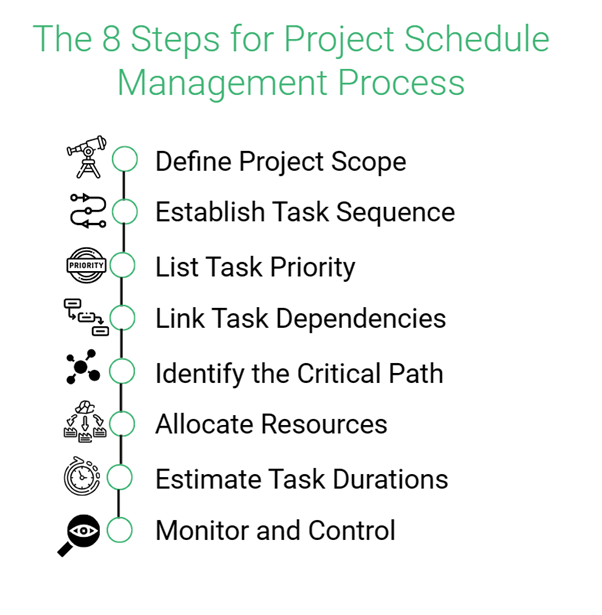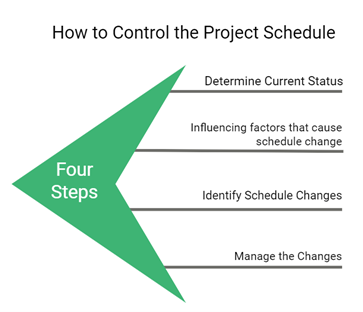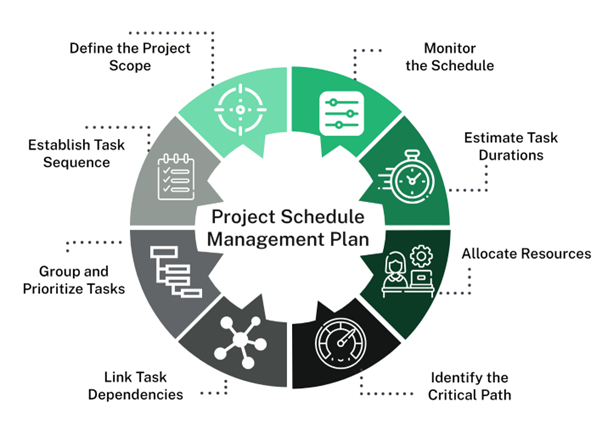
Have you ever wondered why an astonishing 52% of companies are “somewhat or very dissatisfied” with their organization's current level of project manager maturity? The harsh reality is that ineffective project schedule management practices lie at the heart of this alarming statistic. In today's fast-paced business landscape, where time is more valuable than ever, a well-crafted project schedule can spell the difference between success and failure. It is the backbone of any endeavor, providing a roadmap for efficient resource allocation, task prioritization, and risk mitigation.
However, crafting an effective schedule is no small feat – it requires a delicate balance of careful planning, continuous monitoring, and adaptive strategies. Failing to do so can lead to costly delays, resource misalignment, and a domino effect of setbacks that can cripple even the most promising initiatives. Recognizing the paramount importance of project schedule management is the first step toward mastering this critical aspect of project management, unlocking a world of streamlined operations, enhanced productivity, and, ultimately, extraordinary results. This article explores the importance of project schedule management, its benefits, components, and techniques. Additionally, the article shares the benefits of leveraging modern AI solutions for effective project schedule management.
What is Project Schedule Management?
Project schedule management involves meticulously organizing and mapping out the various components of a project within a defined timeline. It serves as a comprehensive roadmap, guiding the project team through the intricate maze of tasks, milestones, outputs, and resource allocations. Akin to a detailed to-do list with specific deadlines, project scheduling entails identifying all the key activities, estimating their duration, and establishing tentative start and end dates for the entire project. This proactive approach ensures that every aspect of the project is accounted for, fostering a well-orchestrated execution and enabling the team to navigate the project's complexities with precision and efficiency.
Why Do You Need Project Schedule Management?
Project schedule management is an indispensable component of project success, as it plays a pivotal role in determining the overall success of a project. The benefits of crafting a well-structured project schedule are manifold:
- Properly executed project scheduling streamlines the entire project, enhancing efficiency and ensuring seamless execution.
- Engaging in the project schedule management process from the outset provides a comprehensive overview of the project's requirements, enabling meticulous planning and preparation.
- It empowers early identification of potential roadblocks, allowing for proactive problem-solving and transparent communication with stakeholders regarding potential delays or missed deadlines.
- Project schedule management is advantageous not only for project managers but also for the entire project team. It fosters a shared understanding of expectations, timelines, and responsibilities, holding everyone accountable to the same deadlines.
- Project scheduling promotes accountability by clearly defining roles, tasks, and due dates. It ensures that every team member knows their specific obligations, facilitating a cohesive and coordinated effort to achieve the project's objectives.
Integrating project schedule management with solutions that serve as a central hub for your projects and initiatives, advanced AI-driven solutions usher in a transformative era, catalyzing unprecedented levels of optimization and precision.
After highlighting the numerous benefits of effective project schedule management, it is crucial to delve into the key components that constitute comprehensive project execution.
What Are the Important Components of Project Schedule Management?
A well-structured project schedule is the backbone of successful project execution. Developed during the planning phase, it serves as a comprehensive roadmap, guiding the team through the intricacies of project completion. The schedule outlines critical deliverables and requirements and establishes a baseline against which actual progress is measured.
The creation of an effective project schedule involves the careful consideration of the following key elements:
- Deliverables - The tangible outcomes or products the project aims to produce.
- Tasks - The specific activities and work packages required to achieve the deliverables.
- Task Start and End Dates - Clearly defined task initiation and completion timelines.
- Task Dependencies - Logical relationships and interdependencies between tasks.
- Project Calendar - Accounting for holidays, weekends, and other non-working periods.
- Work Allocation - Distinct units of work for efficient assignment and tracking.
- Task Duration and Project Timeline - Realistic time estimates for each task, leading to an overall project timeline.
- Budgets - Allocation of resources and funds to specific tasks and deliverables.
- Resource Availability - Assessment of required human resources, equipment, and materials.
- Schedule Risk Analysis - Proactively evaluating potential schedule risks and uncertainties.
By meticulously crafting a comprehensive project schedule and harnessing a project management solution that enhances existing project management solutions with the power of AI, project managers can empower their teams with a clear roadmap for success, enabling effective communication, coordination, and decision-making throughout the project's lifecycle. With the key components laid out, let's delve into the detailed process of project schedule management to see how these elements come together in practice.
Project Schedule Management: Essential Steps and Techniques
Project schedule management is essential to ensure tasks are completed efficiently and on time. Here are the key steps involved:
- Planning and Documentation
- Establish methods and documentation standards adhering to corporate policies.
- Include resource allocation, schedule approval hierarchies, change request procedures, and a detailed communication plan.
- Defining Activities
- Use the Work Breakdown Structure (WBS) to outline necessary tasks.
- Apply the 8/80 rule to ensure tasks are manageable and measurable.
- Identifying Dependencies
- Analyze task dependencies to minimize scheduling delays.
- Engage stakeholders with project management software to strategize around these dependencies.
- Sequencing and Resource Estimation
- Sequence tasks based on dependencies to create a logical workflow.
- Estimate the resources and durations needed, using historical data and educated guesses to ensure accuracy.
- Schedule Development and Control
- Integrate task, resource, and duration data to set start and end dates.
- Utilize scheduling techniques such as the critical path method and resource leveling.
- Continuously monitor progress, making necessary adjustments and implementing controls to maintain the schedule.

Techniques for Enhanced Schedule Management
Employ historical analysis, PERT, and Gantt charts for better time estimations and task tracking. Use schedule compression methods like crashing and fast-tracking to maintain timelines without altering project scope.
By adhering to these structured steps and employing both traditional and modern techniques, project managers can effectively oversee project schedules, mitigate risks, and enhance the likelihood of successful project delivery. This approach ensures that project schedule management remains practical and adaptable to various project demands.
While these techniques are crucial, project schedule management has challenges that must be skillfully navigated to ensure success.
Challenges in Project Schedule Management
Project schedule management is imperative but fraught with challenges that project managers must adeptly manage:
- Uncertainty and Change - Projects are often subject to unexpected changes and uncertainties. Managers must be flexible, crafting contingency plans to adapt swiftly to changes in scope or requirements.
- Dependency Complexity - Effective scheduling requires understanding the dependencies between tasks. Managers need to be aware of how alterations in one task can ripple through to affect others, ensuring the schedule remains feasible.
- Resource Constraints - Scarcity of resources—whether personnel, budget, or equipment—necessitates careful planning. Project managers must strategically allocate these limited resources to achieve project goals without compromising quality.
- Communication Breakdowns - Clear and consistent communication is vital. Miscommunications can cause delays and misunderstandings, potentially derailing the project.
Project managers can enhance project execution and outcomes by navigating these challenges with strategic planning and effective communication. Additionally, you must consider solutions that act as a project management portal to launch other project-related tools.
How to Make a Project Schedule Management Plan

Creating a comprehensive project schedule is essential for successful project execution. Here are the key elements you must consider:
- Define the Project Scope
- Develop a project scope statement outlining the goals, deliverables, features, and budget.
- Identify all tasks required for project completion by understanding stakeholder requirements.
- Use a Work Breakdown Structure (WBS) to organize tasks and establish their sequence.
- Establish Task Sequence
- Determine the order in which tasks need to be performed.
- Identify task dependencies to ensure prerequisites are met before starting dependent tasks.
- Group and Prioritize Tasks
- Categorize tasks based on importance and criticality.
- Break down tasks into milestones aligned with project phases (initiation, planning, execution, monitoring, and closure).
- Use a priority matrix to facilitate task prioritization.
- Link Task Dependencies
- Map out the relationships between tasks to avoid bottlenecks and resource conflicts.
- Identify tasks that can be performed concurrently and depend on others.
- Identify the Critical Path
- Determine the critical path, representing the longest sequence of dependent tasks.
- Utilize the critical path method to identify tasks critical to project success.
- Consider using project management software to simplify critical path analysis.
- Assign Resources
- Allocate resources (human, material, and financial) to each task.
- Ensure resource availability and balance workloads to avoid over-allocation.
- Associate costs with tasks for accurate budget planning.
- Estimate Task Durations
- Leverage historical data, expert judgment, and estimation techniques to determine task durations accurately.
- Consider factors like resource availability, task complexity, and potential risks.
- Baseline and Monitor the Schedule
- Establish a baseline schedule for future comparison and progress tracking.
- Regularly monitor and update the schedule as necessary to reflect changes or deviations.
- Implement schedule compression techniques (crashing, fast-tracking) to meet deadlines.
Following these steps, you can create a comprehensive and realistic project schedule management, enabling effective project planning, execution, and control.
Conclusion
Project schedule management demands unwavering precision in planning, execution, and adaptability - the bedrock of project success. Its pivotal role optimizes resource utilization, timeline adherence, and objective attainment. Embracing best practices and project feedback fosters continuous improvement and overcoming obstacles. A meticulously crafted schedule transcends mere time management, serving as an indispensable strategic roadmap guiding endeavors to fruition. Through comprehensive schedule crafting, critical path identification, and robust technique implementation, project managers orchestrate a harmonious symphony of coordinated efforts, optimized resource allocation, and proactive risk mitigation - the guiding light illuminating efficient objective achievement within prescribed timelines.
Traditional scheduling approaches falter in today's dynamic landscape, leaving teams with complexities and uncertainties. Innovative AI-powered project management solutions like TrueProject revolutionize project schedule management. TrueProject provides insights and analysis that go beyond task management tools. Additionally, it enhances existing project management tools and provides a centralized project health dashboard. Seamlessly integrating with existing applications, TrueProject's advanced AI capabilities offer intelligent scheduling recommendations, real-time risk analysis, and predictive analytics. Empowering features like AI-assisted critical path identification, resource optimization, and schedule compression recommendations enable data-driven decisions, swift adaptation to changes, and unlock new realms of efficiency and productivity. Organizations elevate schedule management by synergizing proven methodologies and cutting-edge AI technology, ensuring meticulous planning, flawless execution, and unwavering success for every initiative.
More information on TrueProject at trueprojectinsight.com

About the Author:
Nisha Antony is an accomplished Senior Marketing Communications Specialist at TrueProject, a leader in predictive intelligence. With over 16 years of experience, she has worked as a Senior Analyst at Xchanging, a UK consulting firm, and as an Internal Communications Manager on a major cloud project at TE Connectivity. She is an insightful storyteller who creates engaging content on AI, machine learning, analytics, governance, project management, cloud platforms, workforce optimization, and leadership.
Endnotes
- Simpliaxis Team. “What is Project Schedule Management and Its Steps?” Simpliaxis: (n.d.). https://www.simpliaxis.com/resources/what-is-project-schedule-management
- Project Manager. “Project Scheduling: How to Make a Schedule.” Project Manager: (n.d.). https://www.projectmanager.com/guides/project-scheduling





